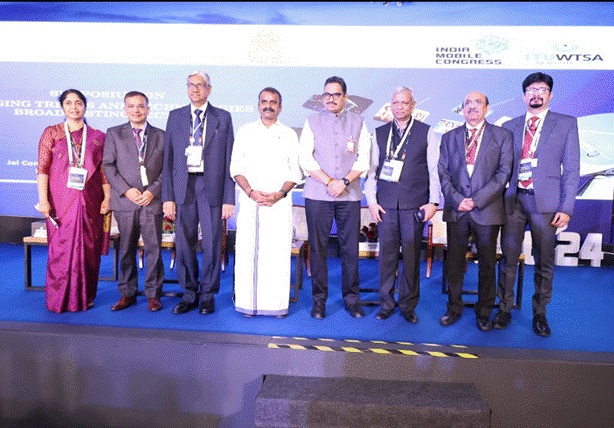
The Minister of State for Information and Broadcasting and Parliamentary Affairs Dr. L. Murugan inaugurated a half day Symposium on ‘Emerging Trends and Technologies in Broadcasting Sector’, organized by TRAI on the sidelines of India Mobile Congress (IMC-2024), today in the presence of Chairman, TRAI Shri Anil Kumar Lahoti; Secretary, Ministry of I&B, Shri Sanjay Jaju; and Secretary, TRAI, Shri Atul Kumar Chaudhary. This event is being held in the backdrop of recent technological advancements in the industry and their growing ensuing impact.

Technology transforming India's broadcasting Sector
In his inaugural address, Dr. L. Murugan, Minister of State for Information and Broadcasting and Parliamentary Affairs, emphasized the transformative impact of technological advancements on India's broadcasting sector, with content becoming the primary focus for viewers. He stressed the need to improve access to broadcasting services for vulnerable populations to ensure their inclusion in social, economic, and political spheres.
We live in a content-driven economy, and India is emerging as a content hub. With the rise of social media, broadcasting has expanded its horizons and to benefit content creators, the Ministry of Information and Broadcasting, Government of India, is organizing the WAVESummit from 5-9 February, 2025. At this summit, content creators will have access to 27 challenges, providing them an opportunity to showcase their talent on national and international platforms, ultimately leading to employment generation.
He called for special attention to the AVGC (Animation, Visual Effects, Gaming, Comics) sector, promoting content production in India through a streamlined single-window system to enhance ease of doing business.
He also mentioned that the recent approval by the Union Cabinet to auction FM radio channels in 234 new cities aims to boost local content and create further employment opportunities. He reaffirmed the Government's commitment to leveraging technological advancements to strengthen the broadcasting sector's role in economic growth and cultural dissemination, ensuring access to high-quality media content for all. This initiative aligns with Prime Minister’s vision of Viksit Bharat by 2047.
Digital Radio, D2M Broadcasting, and 5G Potential
Shri Sanjay Jaju, Secretary of the Ministry of Information and Broadcasting (MIB) in his special address, highlighted the Ministry's role in shaping growth-oriented policies and initiatives for enabling the broadcasting sector. He emphasized the potential of digital radio as an affordable mass communication tool that optimizes spectrum use and delivers better sound quality. He also discussed the benefits of Direct-to-Mobile (D2M) broadcasting, which enables content delivery directly to mobile phones. He highlighted that Prasar Bharati, the public service broadcaster in collaboration with IIT Kanpur and Saankhya Labs, is conducting D2M trials using both high-power and low-power transmitters.
He also spoke on the transformative potential of 5G, especially when combined with immersive technologies like Augmented Reality and Virtual Reality, which could offer highly engaging broadcasting experiences. Additionally, he mentioned the significant growth is expected in the Animation, Visual Effects, Gaming, Comics and Extended Reality (AVGC-XR) sector, which has the potential to boost startup culture, foster creativity, and enhance the experience of content consumption.
Strengthening the regulatory framework
Shri Atul Kumar Chaudhary, Secretary, TRAI, in his opening remarks underlined that today's symposium is in the furtherance of the attempts of TRAI to encourage new discussions and deliberations in the sector, addressing the changes that may be required in the regulatory framework in light of recent developments.
M&E sector to touch ₹3.08 Trillion by 2026
In his keynote address, Shri Anil Kumar Lahoti, Chairman, TRAI underscored the significant growth trajectory of the Media & Entertainment sector, which is projected to reach ₹3.08 trillion by 2026, driven by the rapid expansion of new media platforms. He emphasized the transformative power of immersive technologies, which provides a more engaging and interactive experience.
He highlighted that Direct-to-Mobile (D2M) broadcasting is emerging as an alternative content delivery technology allowing simultaneous broadcasting even without Internet. Additionally, he stressed upon the benefits of digital radio, especially in areas lacking television connections and reiterated TRAI's commitment to provide forward-looking recommendations and regulations that protect consumer interests, ensuring level playing field for service providers and promoting overall growth of the broadcasting sector. TRAI has recently provided its recommendations for the formulation of National Broadcasting Policy.
Exploring Broadcasting's future innovations
Today’s symposium aims to explore the practical applications and transformative potential of immersive technologies across various broadcasting use cases. The deliberations are divided in three back-to-back sessions.
Session 1 would be on ‘Use of Immersive Technologies in Broadcasting Landscape’, followed by session on ‘D2M and 5G Broadcasting: Opportunities and Challenges’ and the last session on ‘Digital Radio Technology: Deployment Strategies in India’.
The speakers in these sessions include the Communication sector, technology experts from television and radio broadcasting fraternities, device and network manufacturers, technology giants and Government. There are more than 100 national and international participants attending this symposium.
For any information/clarification about the symposium, Shri Deepak Sharma, Advisor (B&CS), TRAI, may be contacted on advbcs-2@trai.gov.in.
*****
